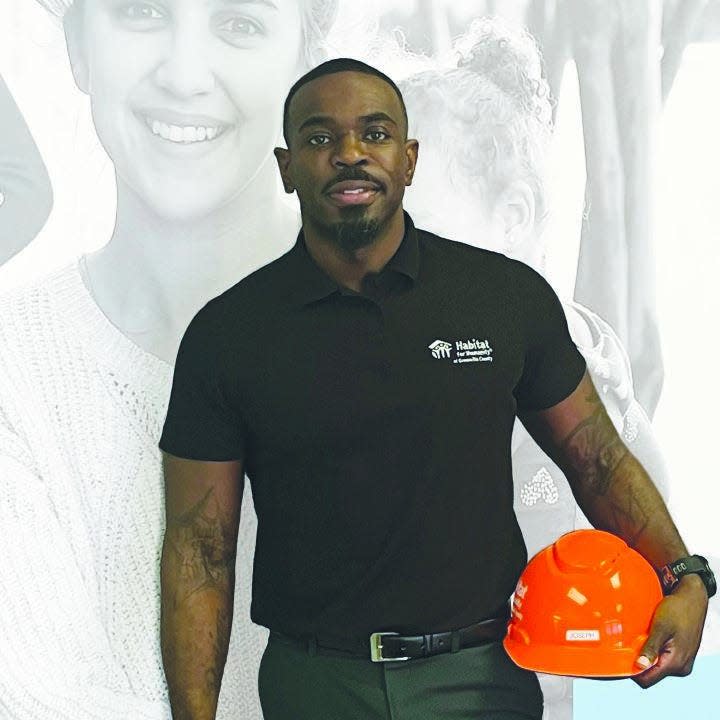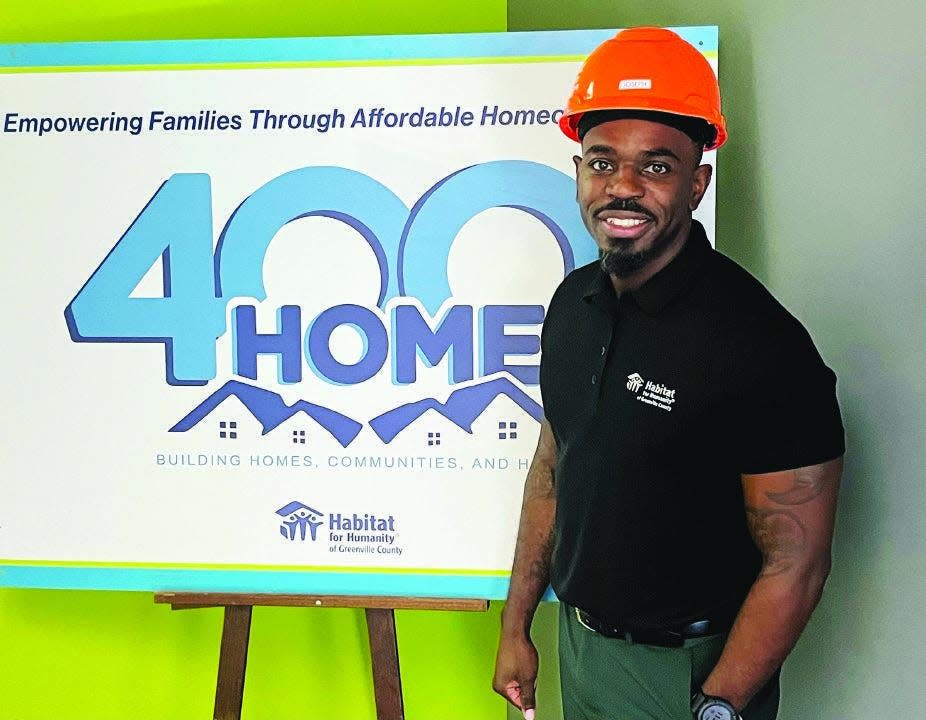Building Homes, Building Hope - Advancing Black Homeownership Project-Habitat For Humanity
Joseph Fields traveled to Honolulu, back to Georgia, and south to the Mexico border before coming home to tackle the barriers that keep Greenville’s Black citizens from owning homes.

Fields leads the Advancing Black Homeownership Project, launched this fall by Habitat for Humanity of Greenville County.
“Homeownership is one of the first paths toward generational wealth. Homeownership – having a decent, safe place to live – is one of the first paths of humanity,” says Fields, Habitat’s Vice President of Equity.
“Diversity is what makes the city thrive and build culture. It can’t be an afterthought. Diversity must be at the forefront of building Greenville.”
Fields might not be back in Greenville if not for his mother … and the Boy Scouts.
While attending Francis Marion University in South Carolina, Fields spent summers from 2009 to 2014 establishing Scout troops in Greenville neighborhoods like Nicholtown, Brutontown and Freetown.
“Today, we call them special emphasis neighborhoods,” Fields explains.
“The irony is that I was never exposed to Scouting because I grew up in those types of neighborhoods.”
Funded by a grant from the United Way to the Blue Ridge Council, Boy Scouts of America, Fields and others earned the trust of skeptical parents and youths.
“Parents would say, 'We don't have the money.' We’d tell them, 'You don't need any money.' They'd say, 'We don't have time.' And we'd say, 'We're coming to you.’
“We saw these young men become stronger young men. That’s what is possible when you remove that dollar sign in a community,” he says.
Fields, a member of the Kappa Alpha Psi fraternity, left Francis Marion to finish his degree at Chaminade University in Honolulu.
He chose a career in law enforcement and began working in Hawaii’s state probation office before moving to the Georgia Department of Corrections in 2019, then the Department of Homeland Security, where he was a Border Patrol agent – and ruptured his quadriceps muscle, the large muscle at the front of the thigh.
“My whole quad blew out; my knee fell to the side,” he says. “I’d worked so hard. I reached the mountaintop. Now it was crumbling down.”
Fields called his mother, who had moved the family to Greenville when Fields was a young child (and after his father was murdered in Grand Rapids, Michigan).
“I broke down like a baby. But she told me, 'It's OK. Trust that God has a plan.' And that's what I did.”
Fields says he kept thinking about his work with the Scouts.
He decided to immerse himself in the community again … at home in Greenville.
“I owe Greenville. My mother moved us here for safety, security and opportunity. And we were embraced. That's what saved me, that's what saved us.”
In 2022, Fields joined Greenville Connects, a nonprofit that advocates for a strong transit system. Then he heard about the job at Habitat for Humanity.
After what he jokingly calls a “gauntlet” of interviews – and cheerleading – from President and CEO Monroe Free and Chief Operating Officer Jennifer Faner, he met with the steering committee for the Advancing Black Homeownership Project … and was hired in September.
Meanwhile, Habitat had been going through changes of its own.
“When George Floyd was murdered (in Minneapolis in 2020), it caused outrage. A lot of money was pledged toward justice in the Black community,” Fields explains.
Philanthropist MacKenzie Scott donated $25 million to Habitat for Humanity International, which launched the Advancing Black Homeownership Program.
The U.S. Census Bureau reported that the rate of homeownership among white people was 73.8% nationwide in 2023, while 45.9% of Black people owned a home in the same year.
In Greenville County, 83% of homeowners are white, according to Habitat Greenville.
A 2020 study by Habitat International states, “Past racial discrimination and continuing housing inequities” have caused a “stark gap in homeownership rates between Black and white households. The nearly 30-point gap grew over the past two decades, resulting in significantly less housing stability, economic security and wealth for Black families.”
The international organization pledged 22 grants to its affiliates. The Grant Funding Manager for Habitat Greenville, Yasha Rodriguez, applied.
Her proposal was accepted.
Now, Fields strategizes and conducts research for the Advancing Black Homeownership Project with Habitat affiliates in cities like Los Angeles, New Orleans and Fort Lauderdale, Florida.
“When you talk to bigger cities about affordable housing and Advancing Black Homeownership ... your hands aren't big enough to get around it,” Fields explains.
“In Greenville, our hands are big enough. But we have to grab it now. If we don't, this is going to turn into a monster that we can't control.”
Fields and his counterparts nationwide have spent months conducting research and listening to people in their communities, while supporting Habitat’s mission to bring families, partners and volunteers together to build affordable homes.

The Advancing Black Homeownership Project won’t detract from that mission or change Habitat’s outreach to people of all races and ethnicities, Fields says.
But Habitat can’t solve the problem alone, he says.
“We must have more Black developers, more Black contractors, and more minority and local businesses involved in Greenville. We can’t have a city that is completely built by white males.”
Along with supporting minority builders and encouraging affordable housing, the program aims to promote socioeconomic growth for minority and Black households.
“In neighborhoods like Nicholtown and Brutontown and New Washington Heights ... We need those young adults to be making $70,000 versus $30,000. We must close that gap.”
Fields says the key is partnerships, including the Greenville Area Chamber of Commerce, the S.C. Minority Business Incubator, Village Launch, Greenville Housing Fund, the City of Greenville, and the Affordable Black Housing Project steering committee: the Rev. Stacey Mills, pastor of Mountain View Baptist Church and Executive Director of Greenville Race Equity and Economic Mobility Commission; the Rev. Sean Dogan, pastor of Long Branch Baptist Church; Greenville Mayor Knox White; Tamela Spann of Hollingsworth Funds; and Samantha Wallace of Bank of America.
“We intend to have a strategic plan to implement by August,” Fields says, “something we believe Greenville will rally around to tackle these issues.”
This article originally appeared on Greenville News: Building Homes, Building Hope - Advancing Black Homeownership Project-Habitat For Humanity

